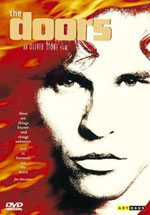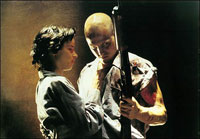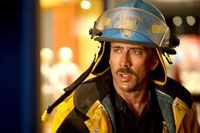Oliver Stone’s new film Savages was released on Ukrainian widescreens on October 4th. It divided the critics even before the premiere. Some say that Stone returned to the roots in his new film – psychology, tough naturalism and non-conformism. Others see the film as a widescreen-format compilation of typical commercial components, including celebrity actors and eye-catching landscapes. The Ukrainian Week finds out what Oliver Stone himself thinks of his movie.
UW: What about SAVAGES appealed to you and made you want to co-write and direct it?
The story was exciting! It was a visceral, unpredictable, fresh and colorful ride for me with surprises and twists and turns all along the way. It’s also a movie that deals with some contemporary subjects like the current war on drugs and where we are now with the drug war on the California/Mexico border. It had all the elements I liked in a film. Actually, it all started with the book written by Don Winslow. We chose it and worked with him for almost a year preparing the screenplay. Then, we showed it to the actors and got the film going.
UW: All of your characters go through an intertwined and also personal journeys, don’t they?
There are six primary characters in a complicated tangle because they all go through changes and end up in a place where they didn’t expect they would go. That’s the case, especially with Ben (the businessman played by Aaron Taylor-Johnson – Ed.), who I think goes the farthest. I like to test my characters.
UW: How did you find the right actors for those key roles?
I met Aaron Taylor-Johnson in London. He was so adorable and pure. I loved him in KICK-ASS. At the time, he had already been offered another big movie but I knew I wanted him for SAVAGES. I told him, “I have another film with a mask for you.” I knew he would form the perfect combo with Taylor Kitsch (who plays Chon, the other protagonist – Ed.), who reeks of loyalty and strength. They worked perfectly for me.
UW: This is your first film with John Travolta. How do you see his role as Dennis, the DEA agent?
I like the part. There is a sort of sleazy ambiguity about that character. Dennis is practical and plays a huge role in the film because he pulls the strings on both sides.
UW: How do you see your job as a director?
Directing is collaboration in the true sense of the word. It’s like the relationship a conductor has with his orchestra. You rehearse, work to set up the right environment, go through every line of dialogue, rewrite and so on.
UW: How useful is the rehearsal period for you?
It is very useful for me – and very intense. I think pre-production is one of the toughest periods on a film because you don’t have anything on film yet. You are building and reaching that moment when you are going to go on set for the first day. You still have uncertainties. I believe the rehearsal process is never really complete.
UW: How much input do you give the actors?
With me, actors have a lot of input in what is said and done. Since I have to edit them and, in a way, see them completely naked, I like to work with them and have options. Sometimes when you don’t have a good relationship with the actors, it’s impossible. However, it works most of the time. My hope always is that they all see the movie and love it.
UW: What influenced SAVAGES?
I mixed the beach blanket surf and the sea story with a modern western. It’s a bit of Sam Pekinpah’s THE WILD BUNCH, King Vidor’s DUEL IN THE SUN and Sergio Leone’s spaghetti westernswith the darkness of the Mexican cartel. There is a mixture of darkness and light in this film.
UW: This is not the first film in which you analyze the nature of violence, correct?
I have always been interested in human beings, relationships and power. This movie is a cat and mouse game about power. Violence has always existed because it’s in our nature, as I showed in NATURAL BORN KILLERS. In SAVAGES, you see violence on display but the characters show love, too. You have to find the balance. You can’t deny or repress your inner violence because it is going to come out in various ways. Using it responsibly and morally is important.
UW: Was it tricky to come up with the adequate amount of violence to show?
We didn’t want to disgust people but this is a cruel world. We chose the violence that we did because it was effective. I think we show much less than what really happens. I’m the first one that gets squeamish with horror movies.
UW: What drives you to do what you do?
I guess there is an inborn rebel in me. I just try to do the right thing. Hopefully I do some good against the injustices in the world before I leave it.
OLIVER STONE’S SUCCESSES AND FAILURES
The Doors (1991)

A genius film about Jim Morrison, music and drugs. A large part of the 1990s generation of Ukrainians grew up on it
JFK (1991)

The scandalous and landmark film where Stone makes the first loud statement in the film industry about a top-level conspiracy to assassinate the president
Natural Born Killers (1994)

Stone’s most revisionist, naturalistic and poetic film about the hypocritical America, cynical journalism and fake values
Alexander (2004)

The first professional and financial flop that showed Stone’s failure at directing a sward and sandal movie
World Trade Center(2006)

A opportunistic, poorly directed and overly sentimental film that did not fit Stone’s reputation as a rebel artist
W. (2008)

Stone’s hatred for George W. Bush played against the director in his own film: the silly-looking character hardly looked negative

